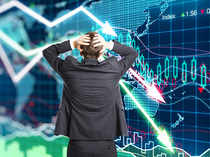 Getty Images
Getty ImagesGoldman Sachs Group Inc. and Morgan Stanley economists joined the rush on Wall Street to declare that the coronavirus has triggered a global recession, with the debate now focusing on its likely length and depth.
A day after President Donald Trump conceded the U.S. slump alone is set to be “a bad one,” economists threw away their forecasts that the world could avoid tumbling into recession for the first time since the financial crisis.
Behind the rethink: The virus’s spread to Europe and the U.S., as well as new evidence that China -- the first to be hit by what is now a pandemic -- experienced a harder hit to its economy than originally projected.
 Bloomberg
BloombergSuch slumps would not be as painful as the 0.8% contraction of 2009, as measured by the International Monetary Fund, but they would be worse than the downturns of 2001 and the early 1990s. Both Morgan Stanley and Goldman Sachs anticipate a rebound in the second half, but warn that the risk remains of even greater economic pain.
The projections will apply further pressure on policy makers to do more to limit the health emergency and to deliver stimulus that helps companies and consumers through the shock and then drives a rebound in demand afterward.
What’ Bloomberg’s Economists Say...
“We are downgrading our forecast for China’s 2020 growth. Our previous forecast for the year was growth at 5.2%. Our new forecast is 1.4%. That includes a 11% contraction in the first quater.” -- Chang Shu, David Qu and Tom Orlik
Although the U.S. Federal Reserve and fellow central banks have been active in loosening monetary policy, most governments have been slow in responding and are only now crafting fiscal packages that may still fail to pacify worried investors.
“While the policy response will provide downside protection, the underlying damage from both Covid-19’s impact and tighter financial conditions will deliver a material shock to the global economy,” Morgan Stanley’s economists said.
The outlook could darken even further if the virus lasts longer than anticipated, or wields greater economic pain -- given factories, schools, restaurants and shops are closing around the world. A freezing up of markets or a continued sluggishness by governments to act are also regarded as threats.
Elsewhere on Wall Street, strategists are laying out what governments should be doing.
At JPMorgan Chase & Co., John Normand advocated developed economies repeating their handiwork of the crisis when they delivered fiscal stimulus worth 1% to 2% of gross domestic product. George Saravelos, a currency strategist at Deutsche Bank AG, said governments may also need to step in to guarantee support for households and companies.
 Bloomberg
BloombergWhile the Fed gets “full marks” for its recent response in cutting rates and moving to stabilize credit markets, Northern Trust Corp. Chief Economist Carl Tannenbaum said Congress and the White House have so far failed to act boldly enough.
“The other side of Washington really needs to step up with something as substantial in size, and intelligent in design,” he said.
China is experiencing the biggest pain, and most economists failed to capture how far it would fall, with the likelihood now that its economy will suffer the worst turmoil in many decades. The Morgan Stanley economists now reckon its economy shrank 5% in the second quarter.
Since the outbreak originated in China, data is being treated by many as a harbinger of what’s to come in other regions. Morgan Stanley predicts the U.S. and European economies will suffer the most in the second quarter.
Predictions for the U.S. still vary wildly, with some guessing activity could even decline as much 10% on an annualized basis in the three months through June. Goldman Sachs is penciling in a 5% dive after zero growth in the first quarter.
“The middle two quarters of this year are going to be very challenging, even if we get the spread of the coronavirus under control quickly,” said Tannenbaum.
Download The Economic Times News App to get Daily Market Updates & Live Business News.
Subscribe to The Economic Times Prime and read the Economic Times ePaper Online.and Sensex Today.
Top Trending Stocks: SBI Share Price, Axis Bank Share Price, HDFC Bank Share Price, Infosys Share Price, Wipro Share Price, NTPC Share Price
Read More News on
Download The Economic Times News App to get Daily Market Updates & Live Business News.
Subscribe to The Economic Times Prime and read the Economic Times ePaper Online.and Sensex Today.
Top Trending Stocks: SBI Share Price, Axis Bank Share Price, HDFC Bank Share Price, Infosys Share Price, Wipro Share Price, NTPC Share Price












 Get Unlimited Access to The Economic Times
Get Unlimited Access to The Economic Times
